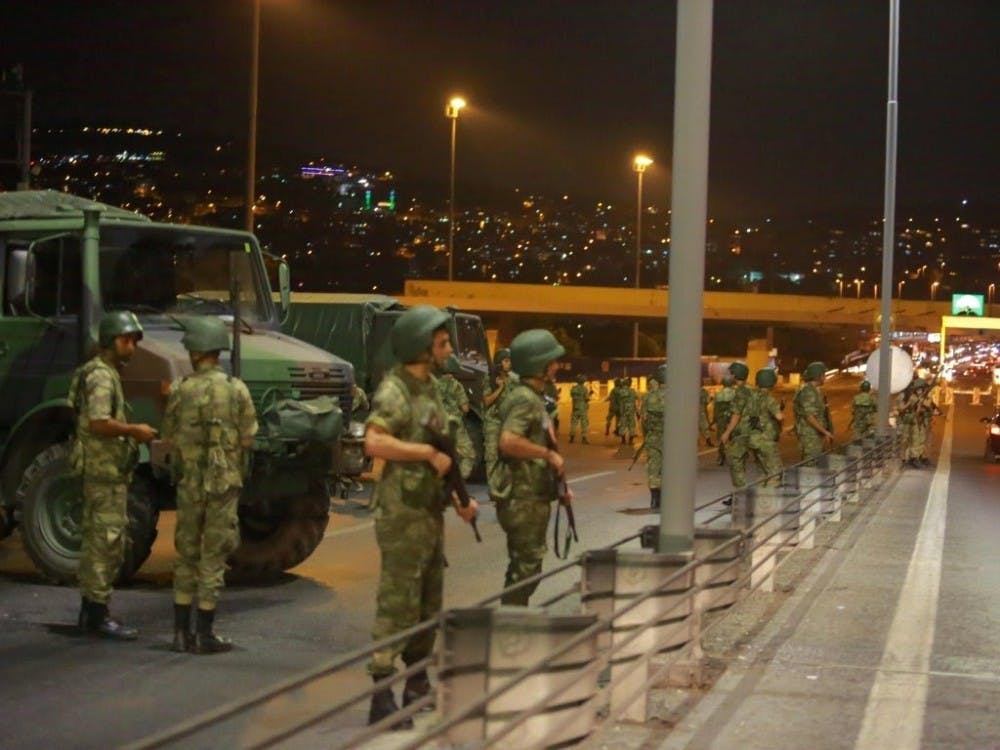A faction of the Turkish army initiated a surprise coup attempt Friday against the Turkish government, blocking Bosphorus Bridge, which connects Europe and Asia. During the coup, 290 people were killed and more than 1,400 people were injured. Sophomore Fulya Keskin, a native of Istanbul, experienced the events firsthand. The Chronicle's Claire Ballentine spoke with her about the chaotic night and how she stayed safe.
The Chronicle: Where were you during the coup attempt?
Fulya Keskin: I had just got back home from my internship. That morning my mother had warned me about public transportation, but I thought she was being paranoid and overprotective as she always is. I can't blame her though, considering the numerous terrorist attacks have occured in Turkey lately. First thing I heard that evening (July 15), which made me suspicious was that some soldiers had closed the traffic from the Asian side to the European side. Crossing the Bosphorus Bridge is a part of my daily commute, so I was really glad I made it to the European side without getting stuck.
TC: What were the biggest dangers to you personally? How did you stay safe?
FK: Later that night, there was so much noise outside. Weirdly enough, it never seemed to end. So it couldn't be bombs, I thought. At some point, it got so terribly loud that I was almost convinced I went deaf. Everyone was texting or calling someone, but they were all speculating about different scenarios—it was simply impossible to follow all the theories and form an opinion of my own.
As I was desperately trying to connect to the Internet and follow the news from both local and international TV at the same time, I fell asleep on the couch. I was interrupted by another earsplitting noise, and I was 100 percent sure this time it was a deadly bomb. But my parents consoled me saying "oh don't worry, it's just a few F16 jet fighters flying around." What a relief, I thought, I'm not even able to tell military aircraft from an actual bomb.
And how did I stay safe? Pure luck, frankly. Windows were shaking, jets were striking around, gunfire was heard. If I were to get just a bit closer to the windows there was a big chance they would shatter on me. Also, if I had left my workplace an hour late, I could have been stuck on the bridge, in the middle of a freak show: soldiers shooting civilians, civilians defending themselves to the point that they destroyed the bodies of soldiers and God knows what else. I don't care which definition would please political masses, be it coup or terror attack—it was a war scene for me.
TC: Can you tell me a little about your background—did you grow up in Turkey? How long have you lived there?
FK: I was born and raised in Istanbul. I lived in Ankara, the capital, for a few years when I was a child. Having lived in Istanbul nearly my entire life, I became a good witness of all the changes in my city. While this might be quite useful for articles like this and perhaps for history books in future, it has been a heartbreaking process for me.
Personally the worst part was when I was in Istanbul for Spring Break, hoping for a refreshing break from Duke and classwork.
Yet by the time I got back to Duke, there had been two more devastating terror attacks in very central areas of Turkey. When classes started and everyone was talking about their trips to Florida or Mexico or South America and how amazing the sunshine was, I was deeply, inexplicably frustrated. Not because Istanbul weather was anything less than Mexican sunshine. Certainly not because I was jealous. It was because my city deserved better.
I went back to Istanbul because there was nowhere else I'd rather be. But let alone an average holiday, my spring break turned out to be a psychological burden on me.
TC: What has the aftermath been in your city? How has it affected your life?
FK: To my surprise, it seems like everyone, particularly the young population, simply goes on with their routines as they used to. It might be because of my neighborhood, though. Not that it's a bad thing, but I think people rather quickly switched from their alarming states to ordinary lives, posting photos on Instagram, shopping, traveling, etc. I am happy that my people are resilient and strong. In my opinion, this is because so many devastating things have happened so far that Turkish people's pain threshold has gone way up. I observed that we have developed some sort of sad numbness; we will mourn, but nothing can shake us to the core. Especially after the failed coup, I doubt that Turkish people will be surprised by anything.
When you live in such a chaotic zone, unless there is a physical damage, I believe the psychological realization hits each person at a different time. For some, the coup might have been the trigger. For some, it might have been the explosion at the Atatürk airport. Personally, I had my worst experience when the Taksim and Ankara attacks happened in March. Since then there hasn't been a major change in my life—so much has changed before anyway! Right now I'm just grateful that my loved ones are safe. And I have learned this is all that matters.
Editor's note: This interview was conducted via email.
Get The Chronicle straight to your inbox
Signup for our weekly newsletter. Cancel at any time.

